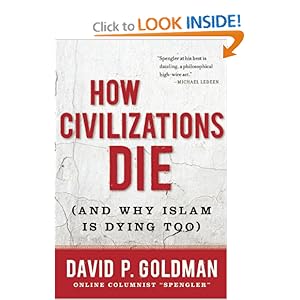In How Civilizations Die (and Why Islam Is Dying Too) (Regnery, 2011) , David P. Goldman (blogger “Spengler”), dismisses the Darwinian account of altruism as follows:
Plainly, societies cannot exist without altruism. In the extreme case they could not defend themselves against external threats unless some of their members were willing to die in order to preserve their society. Richard Dawkins and other self-styled New Atheists postulate that humankind evolved a genetic predisposition to altruism. This assertion is something of a flying spaghetti monster. Among all American ethnic groups, Jews share the most consistent gene pool – as studies have established beyond question – the result of two thousand years of marrying within the same community. Yet secular Jews show the least altruism – at least in the form of willingness to raise children – of any group of Americans, while religious Jews show one of the highest degrees of altruism by the same measure. A religious explanation of altruism, not a genetic one, fits the facts. (Pp. 195-96)
